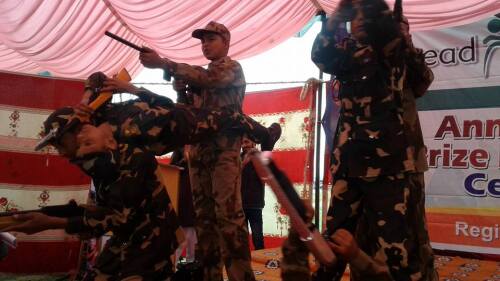Darul Qasim is an institution belonging to the Deobands, a hardline South Asian movement established in the 19th century, whose offshoots include the Taliban. |
Darul Qasim, an Islamic seminary in the suburbs of Chicago, has announced that the Illinois Board of Higher Education (IBHE) has awarded the institution “a license to operate as a college.”
Founded by Shaykh Mohammad Amin Kholwadia in 2000, Darul Qasim offers courses on Islamic law, theology, Qur’an recitation, among other Islamic topics. Ultimately, according to the IBHE, Darul Qasim is working to provide “a master’s level degree in Islamic Law and Theology.”
The IBHE seems to believe, however, that the institution “primarily serves Muslim students from diverse ethnic minority groups” and turns them into “imams (spiritual leaders) for Muslim communities, counselors, and chaplains.”
But Darul Qasim is not just a Muslim college. It is an institution belonging to the Deobands, a hardline South Asian movement established in the 19th century, whose offshoots include the Taliban.
Various Deobandi institutions and madrassahs across South Asia have long been considered key driving forces behind Islamist terror in the region. In 2011, Dr. Ejaz Hussain, at the University of Pennsylvania, estimated that although just 20 percent of Muslims in Pakistan are Deobandi, some 90 percent of terrorist operatives are from Deobandi backgrounds.
However, the Deobandi sect contains many different sub-movements; some of which have few links to terrorism or violence.
Darul Qasim certainly appears to be a lawful, peaceful component of this global movement; but it does not hide its Deobandi ideals. Its faculty almost all claim to have been educated at Deobandi institutions. And Darul Qasim’s website is filled with references to Deobandi ideas, including defenses of a curriculum named Dars-i-Nizami, which is used globally by Deobandi institutions.
Consequently, hardline ideas are taught at Darul Qasim to its young students.
In 2009, Darul Qasim’s founder and current head, Shaykh Amin Kholwadia, explained that the punishment for acts of homosexuality is death: "[Prophet Muhammad] did say that you should kill that person ... there’s no prescribed method of killing or executing those people. The issue was just to, if you do find them guilty, then you best remove them from sight.”
Amin repeated this advice in another Darul Qasim talk in May 2022, during a talk about the punishment of homosexuals, declaring that the punishment for extramarital sex is to be “stoned.” He also despaired that other American Muslims “get onto the bandwagon of the liberal movement and they assume everybody in the USA is with the gay movement.”
In another talk, given in 2013, Amin discussed “premarital relationships” and explained: “And how do you punish such people? So the Qur’an says, this is the way you punish such people. First ... you flog each one of them, the boy and the girl, the man, and the woman – 100 lashes.”
Some of the rhetoric expressed by members of the faculty at Darul Qasim is also alarming. Hisham Dawood, for instance, is the Chair of the Department of Islamic Law at the college.
Muslim women, Dawood claims, should be discouraged from leaving their houses, in order to “ensure that the fabric of communal modesty remains unviolated.” He explains that “Habitual attendance in public causes an obvious laxation in morals,” especially “in light of the immodesty and fitnah which is rife in this day and age.”
Dawood rules that women “must wear hijab,” there can be no “intermingling of sexes,” and a woman may only leave the house if “the husband or a mahram [guardian] should accompany her.” Meanwhile, “Men may go out for recreational purposes,” he explains, “provided that the spot is not one of fitnah [disorder] and vice.”
On paper, there are some encouraging signs at Darul Qasim. One article on the institution’s website, for instance, states that “We must appreciate that in a non-Muslim country recourse to Islamic law is not required, nor should it be sought outside of the law of the land.” In academic circles, meanwhile, Darul Qasim has been lauded as an example of a “neo-conservative” strain within Deobandi Islam that is contributing to a revival of “Islamic rationalism.”
Nonetheless, accreditation for Darul Qasim means access to federal funding and subsidies. It means legitimacy, power and taxpayer assistance afforded to a madrassa not serving general American Muslim interests, but working to advance the agenda of a specific radical sect, and whose faculty members openly advocate a medieval system of justice. The Illinois Board of Higher Education, it seems, is helping to ensure that the next generation of Muslim imams and chaplains in America will have been Islamist-trained.
Sam Westrop is director of Islamist Watch, a project of the Middle East Forum.








